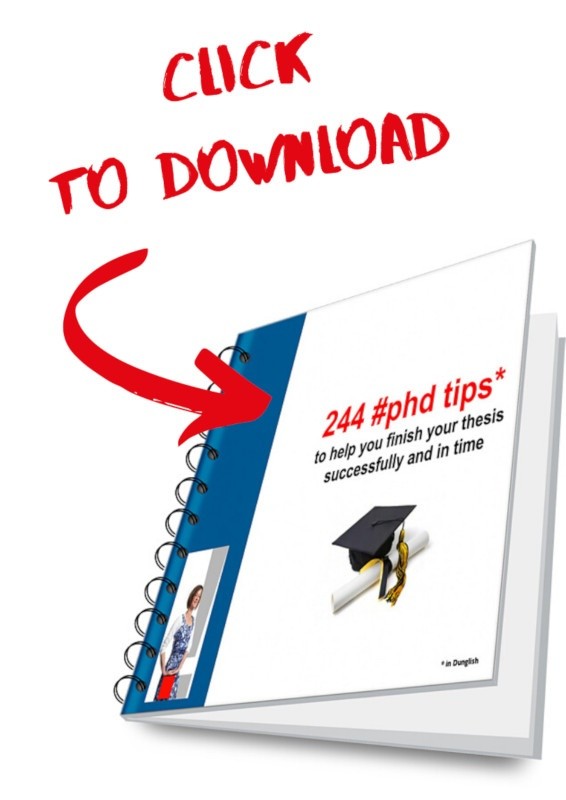Often I am asked what the most important tip is for writing effectively. Of course, there is a lot to say about that, you can become more effective in many different ways, but the most important thing you definitely need to do is to separate the different phases in writing. What do I mean by that?
A lot of PhD students start to write.
They sit down behind the computer, type a few bits and pieces, read again, look for some literature, do some cutting and pasting, rephrase a sentence or two, think of a new title, work on their conclusion, notice that their theoretical framework is not yet complete so do some more research and think about the implications for the method section, analyse their data a bit further and then have to go back to their framework again…
This description might be a bit exaggerated, but it is what I see happen most of the time. The majority of PhD students do a little bit of everything. They are – so to speak – juggling with too many balls at the same time; they are busy with:
- rephrasing
- working on the structure of the text
- getting clarity on argumentation
- checking literature
- thinking about the content
- wondering whether they need more information or if they already have enough
- rephrasing titles
- changing paragraphs
- wondering if the different parts they wrote really fit together
- asking themselves what their supervisor will say about their text
- scrolling back and forth through their text
- changing the order in the text
- checking their grammar
- writing up their figures and tables
- analyzing their results
- looking for new literature
- polishing up their layout
And I can expend on this, you probably also…
You can imagine that it is not very effective and efficient to be busy with so many things at the same time. It makes your brain spin, you simply cannot handle all those things at the same time. It is like juggling with a lot of balls at the same time, virtually impossible for almost everyone. Juggling with two or three balls, that might be doable, but not with more…

So what you need to do to write more efficiently and effectively, is to divide the writing process into different phases. And those phases are actually quite straightforward; they are called preparation, (free) writing and revising.
What is what?
Preparation means thinking about your structure, finding literature, thinking about your audience, knowing what goal you want to reach with your text, making sure you know the deadlines, and planning. So preparation is everything you need to ensure you can start writing.
If all goes well, you will have a design for your text when you have finished preparing. And the more detailed your design, the easier it is to write. So it is very helpful for yourself to not only write down a few keywords as your design but to actually make a detailed table of contents or some kind of ‘construction plan’. There are a lot of books in which you can find different methods for that.
In the next phase, the (free) writing, it is important that you write as fast as possible. Not producing perfect sentences and paragraphs, but actually filling in your design as fast as possible. No worries about grammar, style and so on. Because that belongs to a different phase: the revision. Whilst writing, all you do is jot down everything that should be on paper, based on your design.
When revising, you start to correct your text at different levels: you look at the structure as a whole (is the design I made visible in my text?), you look at paragraphs (are my paragraphs actually paragraphs, according to the rules?), you look at sentences, at grammar, spelling and layout.
If you divide your writing into those small portions, and actually start to write according to the different phases in the writing process, you turn writing into manageable tasks; you are able to juggle with a few balls at the same time, instead of trying to keep all balls in the air!
And it’s a guarantee: working like this makes you much more efficient!
photo via Flickr, many thanks to Helico





Hello Madame… have a nice day.
I need help for write a article in IEEE journal, but my languaje is spanish… and i have very bad grammar in english. How do you help me?? taxes?? payment options?? or you are free??
I wait your comments… good luck…
Julián Peláez Restrepo, Ph.D.
Electronic Engineer with enphasys in power electronics and rewable energy.
Degree in Colombia http://www.uniquindio.edu.co (Engineer) (2005)
Degree in Spain http://www.urv.cat (MSc, Ph.D.) (2006-2011)
and Working in Colombia http://www.itm.edu.co (Assitain Professor) (2012 – XXXX)
Dear Julian, I recommended you to find a good translator :-), that might be your best option I guess. As I don’t speak Spanish, I can’t be of much help I’m afraid… Kindly, Arjenne
Your initiative is terrific. You may also want to explore these tools from Academic Joy: http://www.academicjoy.net/resources-tools.html .
In particular, there is an interesting list of writing resources you would definitively recommend to your readers here:
http://www.academicjoy.net/phdcandidate-writing.html
I hope this helps.
A.J.